
 |
|
|
|
The Criterion Collection's prime function is making great filmmakers accessible to the home video audience. Their new dual-format disc set The Essential Jacques Demy contains excellent restorations of the marvelous French director's best films. Always a loner exploring new avenues of music and romance, Demy's work will delight fans of his international success The Umbrellas of Cherbourg.
Jacques Demy is not categorized as a French New Wave filmmaker, but his Lola (1961) has the look of a Nouvelle Vague feature. It was filmed mostly with available light on location in the seaport of Nantes, with all audio dubbed in post-production. The B&W Franscope images slowly build a dizzying tangle of romantic relationships that center on the handsome but aimless Roland Cassard (Marc Michel) and a singer and bar hostess, Lola (Anouk Aimée). Roland meets an attractive widow (Elina Labourdette) in a bookstore, and offers advice to her daughter Cécile (Annie Duperoux). Roland encounters Lola and soon falls in love, but the timing isn't right. Lola spends the night with an American sailor friend, yet is saving her heart for a long-lost love that abandoned her with child seven years ago. In Lola fate takes the form of accidental meetings, which happen easily in an ornate courtyard shopping arcade frequented by most of the characters. All of the lovers have histories of mistakes and broken hearts, but none of them realize that their personal stories are part of a larger, repeating pattern. Lola would rather wait for her dream lover to return than commit to Roland. When young Cécile is taken to a fun fair by Lola's sailor friend and falls madly in love with him, she's unaware that the exact same thing happened to her mother, and Lola as well. Jacques Demy is reminding us that our romantic experiences are private, yet shared by all. Despite the gray realism of the cinematography, fantasy elements slip into Lola. Sailors dance and drink at Lola's nightclub, where every working girl has a heart of gold. Cécile is barely in her teens, but we see her enraptured by love and ready to make a life-changing decision. 'Magical' timing brings people together and keeps them apart. Roland just misses an appointment for a job with a diamond smuggler, an accident that saves his skin. Appearing periodically through the picture is a tall man in a white Cadillac, who may hold the solution to several relationships. Demy references other romantic movies as well. Elina Labourdette starred in the classic Les dames du Bois de Boulogne as a woman trapped in a sordid compromise; her character in Lola is determined to save her daughter from the same fate. Roland Cassard attends a matinee of Return to Paradise, in which Gary Cooper's sailor abandons his own daughter on the South Seas island of Matareva. When another character seeks to explain his long absence, he talks about being marooned on an isle called Matareva. Demy converts these previous movies into quasi-prequels. Because its original negative was destroyed in a fire, the fine-quality restoration of Lola seen here is a genuine rescue job. Demy and his cameraman Raoul Coutard don't frequently film Anouk Aimée in extreme backlight, and she persists in looking ravishing even when the image is purposely overexposed. Criterion's extras include a 2012 interview with Ms. Aimée, another with Agnés Varda and four complete early films by Jacques Demy. One early student film points directly to what would later become the director's main theme: a young man wallows in self-pity after a romantic breakup. 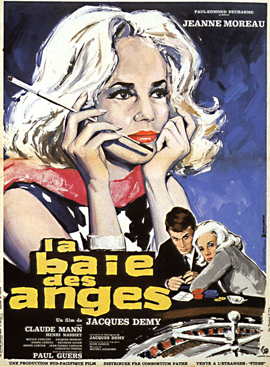
Judging by the success of Lola director Demy had his pick of actresses for his next film. Bay of Angels (La baie des anges) features a remarkable performance by Jeanne Moreau as Jackie Demaistre, a serious gambling addict. Demy once again gravitates to the seaside, this time to the casinos of Southern France. Bored bank clerk Jean (Claude Mann) catches the gambling bug after winning half a year's pay in just a couple of hours. He meets and beds Jackie, an utterly charming but hopelessly corrupted devotee of the Roulette Wheel. Having left her ruined marriage behind, Jackie bounces erratically from city to city and also from man to man. Both she and Jean have excellent luck. Jean finds out what it is like to buy expensive clothes and dine at the most exclusive eateries. But the troubled Jackie doesn't know when to quit, and loses money almost as fast as she wins it. When he first sees her, in fact, she's being ejected from a casino for attempting to steal chips. The practical Jean averts disaster more than once by announcing that he's held some cash in reserve. Jackie soon loses track of whose money is whose, and simply assumes that he'll give her everything he's got. Other directors' movies about gambling addicts almost always end in tragedy. At first Bay of Angels makes winning a lot of money seem a possible way to make a living. But the emptiness of the lifestyle comes through as well. When he meets her, Jackie has nothing left except the clothes on her back. She talks about redeeming the jewelry she's pawned but keeps returning to the tables instead. The longer Jean stays with her, the more she revises her backstory to align with the truth, rather than the face-saving lies she told him on meeting. Demy's direction of one of France's top stars is flawless. Just as notable is his refusal to criticize or condemn the unpredictable Jackie, no matter how reckless or abusive she becomes. Jean accepts her for what she is, and sticks with her. They're a remarkable couple; even if their lifestyle seems wholly unsustainable. The movie is a fascinating peek at a curiously detached existence. Criterion's extras emphasize Jacques Demy's appeal to potential actresses, as the usually calm Jeanne Moreau enthusiastically endorses him in an old television interview. Instead of choosing mainstream work, Demy concentrated on expressing his romantic themes. His main collaborator would be the composer of the music for his first two films, Michel Legrand. 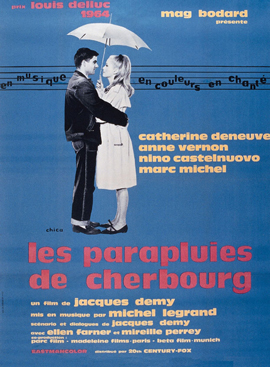
1964's The Umbrellas of Cherbourg (Les parapluies de Cherbourg) is the movie that put Demy on the map. In America it has been rediscovered by succeeding generations of French language students, in the same way that The Red Shoes inspires budding ballerinas. French directors admire American musicals but only Demy has found success adapting the highly artificial genre to his own temperament. A fully sung jazz operetta, the movie's soundtrack had to be finessed and recorded before filming took place, so that Demy's non-singing actors could lip-synch to the lyrics. Michel Legrand's music is nothing less than enchanting, and his main romantic tune is still an instantly recognized standard. Adding to the film's legend is its 'discovery' of Catherine Deneuve, one of the most enduring of French stars. For his first film in color Demy adopts an extravagant visual style, even though most of the film was made in a realistic setting, the port of Cherbourg. Just as in an MGM musical, bright primary colors are everywhere and costumes and props are carefully matched to the sets. Yet the story Demy tells is not an escapist fantasy. Umbrella shop girl Geneviève and mechanic Guy (Catherine Deneuve & Nino Castelnuovo) fall madly in love but are forced to separate when he's called up for military duty in Algeria. When she becomes pregnant and Guy's letters stop coming, Geneviève's practical mother (Anne Vernon) insists that she accept a marriage proposal from a wealthy diamond merchant. An undefeatable Great Love seems doomed to tragedy, as Geneviève realizes that she's just another victim in the world's oldest story. The film surprised audiences everywhere. The format takes just a few seconds to win us over. Because the entire movie is sung to music, there are no awkward transitions between normal dialogue scenes and musical numbers. As in West Side Story we don't mind hearing people sing instead of talk in completely realistic backgrounds, such as the shift change in an auto repair garage. Unlike West Side Story, the romantic fantasy flows, without stylistic breaks for ordinary scenes. The Umbrellas of Cherbourg puts some audiences through an emotional wringer. The lovers' farewell at a rainy train depot fully conveys the desire to die rather than be separated, when two years seems an eternity. But Geneviève and Guy have already succumbed to their passion in a scene that of powerful visual symbolism. The inevitability of it all is expressed when they drift in the direction of Guy's house, without walking. The lovers know where they'll end up, and the film simply cuts to static images of the path to Guy's bedroom. The bright colors seem to depart for the later chapters, when reality forces Geneviève to betray her love. It's at this point that Umbrellas takes the leap into Jacques Demy's world of 'romantic relativity'. The cool diamond merchant sees and wants Geneviève, and maneuvers himself into a proposal as if conducting a smooth business negotiation. He's none other than Roland Cassard from Lola, played again by Marc Michel. Roland's music cue returns as well. Having lost the love of his life, Roland found his calling in the diamond trade and is more or less shopping for a wife and family on his own terms. He's sincere but cool, and by no means the same broken-hearted man who moped around Nantes. As Roland tells Geneviève's mother about Lola, we suddenly see that ornate shopping arcade again, this time in color. We spend the rest of the movie dreading what will happen when Geneviève and Guy meet again, for each has betrayed the other. Demy and Legrand have such control over the film's emotional flow that the snowy climax of Umbrellas achieves an impact equal to that of a classic opera. The extras for The Umbrellas of Cherbourg grant us a full appreciation of how difficult it must have been for Demy and his designers to build a stylized reality from scratch. Demy and Legrand timed out the entire movie soundtrack in advance, leaving room for stage business and transitions. It's amazing that the final action and performances never seem locked into a rigid pattern. Several interviews cover the making of the show. Ms. Deneuve underwent a full makeover to become the film's blonde, virginal Geneviève, a change that she initially resisted. Only a director like Demy could inspire such trust. 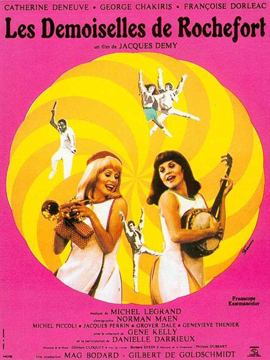
1967's The Young Girls of Rochefort (Les Demoiselles de Rochefort) spreads the musical-cinematic ideas of The Umbrellas of Cherbourg across a larger canvas and adds the dimension of dance. Its multiple romances play out similarly to Lola: when a music & dance company comes to Rochefort for a big boat and recreation show, a dozen potential lovers criss-cross in the streets, almost making the right romantic connections. Every line of dialogue is sung to Michel Legrand's music score and all the stage business is choreographed. Demy's newest collaborator is Hollywood's own Gene Kelly. This time the tone is light and breezy. Show dancers Etienne (George Chakiris) and Bill (Grover Dale) must find replacements when their female counterparts decide to run off with sailors. Enter the Garnier twins, ballet teacher Delphine (Catherine Deneuve) and piano teacher Solange (Françoise Dorléac). Delphine is breaking up with the owner of an art gallery who displays a painting by young soldier Maxence (Jacques Perrin) that looks just like Delphine. Maxence has never met Delphine but he does know her mother Yvonne (Danielle Darrieux), and tells her that he's searching the world for the feminine ideal represented in his painting. Yvonne pines for the lover she spurned ten years before for frivolous reasons. He's Simon Dame (Michel Piccoli), who's just returned to Rochefort thinking that Yvonne's long gone to Mexico. Simon is soft on Solange, but she wants to go to Paris to meet successful composer Andy Miller (Gene Kelly). Add to that several other characters whose random destinies hinge on chance encounters in Rochefort's charming streets, and it's hard to tell who will end up with whom. The film's ambition seems to be to revive and develop Hollywood's abandoned tradition of MGM musicals. Every scene has at least one song, and even more combine singing with dancing -- lots of dancing. The leading characters dance on the street, in hallways, just about everywhere.The twenty or so squeaky-clean show dancers do large-scale numbers in every open space in town. The lengthy Rochefort eventually wears us out. Michel Legrand's music has energy and style but is short on truly memorable melodies. There are also talent issues, in that the non-singing actors can be dubbed but they can't become real dancers overnight. Thus pros like George Chakiris, Grover Dale and Gene Kelly rein in their skills, while the gorgeous sisters Deneuve and Dorléac seem stretched beyond their abilities. They move well and have grace to spare, but are no match for the pro dancers around them. Yet they're a knockout in shimmering crimson dresses, in a dance modeled after Jane Russell and Marilyn Monroe's big number in Gentlemen Prefer Blondes. Demy's charming screenplay is more than a little quirky. For several characters romantic Nirvana is just a chance meeting away. All subsist on their romantic dreams. Most of the older generation must live with bad decisions in their past. Yvonne told Simon she was pregnant with his child but left with another man to live in Mexico -- because she didn't like his name. In contrast to the mix 'n' match sweetness of most of the proceedings, a bizarre tangent surfaces about an axe-murderer. The weird subplot is treated as no big deal, yet has two songs associated with it. Criterion has located vintage interviews with Demy and his collaborators, as well a TV show about the making of the film. Also included is Agnés Varda's retrospective documentary The Young Girls Turn 25. Sadly, co-star Françoise Dorléac was killed in a car accident not long after the premiere. 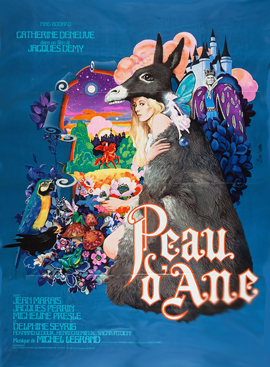
1971's Donkey Skin (Peau d'âne) takes Jacques Demy in a new direction. It's again a musical, a faithful adaptation of a classic Perrault fairy tale with a conclusion very much like Cinderella. Told in simple terms yet given an eccentric spin, Demy and composer Michel Legrand's show is often hilarious but never disrespectful. It was intended for all ages, although today's PC-minded parents might object to the story's main conflict as unsuitable for children. Part of the charm of Donkey Skin is Demy's refusal to soften elements of the original fairy tale. It stars the perfect fairy tale princess Catherine Deneuve. A happy kingdom despairs when its Blue Queen falls ill: she makes her husband The Blue King (Jean Marais of Cocteau's Beauty and the Beast) promise to remarry only when he finds someone more beautiful than she. Pressured to produce a male heir, the King discovers that his own daughter, the Princess (Deneuve) is the only woman more beautiful than her mother. Confused, the Princess is willing to marry her father because she indeed loves him. But the opinionated Fairy of the Lilacs (Delphine Seyrig) counsels that one mustn't confuse two different kinds of loves. She has the Princess stall her father with demands for the making of three fabulous dresses. When the King still insists on marriage, the Princess asks a price that the Fairy is convinced he won't pay -- the skin of the King's magic donkey, which produces not manure but gold and jewels. But to the Princess's horror, her father makes the sacrifice and delivers the donkey skin. Now the Princess has no choice but to run away. To our surprise, the incest theme in Donkey Skin turns out not to be a problem. As Demy and a collection of psychologists explain in the disc's interview extras, when young girls are asked who they want to marry, many will say, "Daddy". The story also includes a wealth of amusing details unlikely to surface in a Disney-fied fairy-tale adaptation. The sight off the 'Royal Donkey' defecating gold coins and rubies is hilarious, as is an obnoxious crone character that literally spits toads. Told that anyone whose finger fits into a tiny ring can become the bride of the handsome Prince Charming (Jacques Perrin), ladies and maids boil the fat off their fingers or whittle them down with knives. Demy's fairy tale land is designed and constructed with remarkable taste, making the movie highly enjoyable just on the visual level. The servants in the Blue Kingdom are literally blue, as are their horses. The hairstyles are ornate and the three magic dresses are impressively designed. The 'dress like the weather' appears to have clouds flowing across its folds. Michel Legrand's songs carry playful lyrics that criticize the characters. When the Princess disguises herself as a ragged peasant in the forest, the villagers sing lyrics about how filthy she is. Te lovers' duet has words almost as silly as their instant affection. The story works its way to a logical conclusion without hyping the Perrault original. It turns out that the Lilac Fairy had a secondary motive in not allowing the King to marry his own daughter. His arrival on a 'magical' transport never fails to get a laugh. 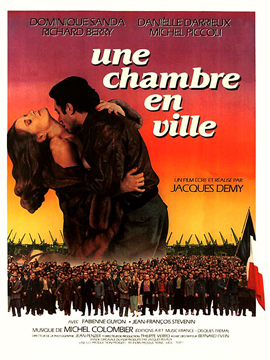
Demy planned for years to make 1982's Une chambre en ville, an original opera for the screen that takes a much darker direction than his earlier work. This time his musical collaborator is Michel Colombier, who provides duets much more like traditional opera than Michel Legrand's more playful jazz themes. A terrific B&W opening scene sees striking shipyard workers in Nantes of 1955 squaring off with riot police, and exchanging chanted lyrics in a call & response pattern. When the police charge the film suddenly cuts to color. The strike then becomes a background for the problems of François Guilbaud (Richard Berry), who argues with his wealthy landlady 'Baroness' Margot's Langlois (Danielle Darrieux). Guilbaud has decided that his faithful and adoring girlfriend Violette (Fabienne Guyon) bores him, but he goes crazy for Edith Leroyer (Dominique Sanda), a runaway wife. To spite her impotent husband Edmond (Michel Piccoli), Edith has taken to prowling the streets for lovers, wearing only a long mink coat. Guilbaud discovers that Edith is actually Margot's estranged daughter. Violette is expecting a marriage proposal, not knowing that Guilbaud has instantly committed himself to Edith; while the insanely jealous Edmond threatens to kill Edith with a straight razor. Une chambre returns us to the city (and shopping arcade) of Lola, adding story elements from Umbrellas of Cherbourg. Just like Genevìeve and Guy, Guilbaud meets Violette after work, but their relationship is one of discord. The strike situation seems to throw everything off-kilter, as Guilbaud chooses this time to argue with Margot and dump poor Violette, and the unbalanced Edith walks the streets looking for a way to escape a husband she's grown to loathe. It's no wonder that audiences didn't respond, as the film's mood is cheerless and there's nobody to root for. The movie is a highly personal effort by Demy, yet its meaning is elusive -- the impressively executed 'musical riot' scenes fail to connect with the overheated personal tragedy. The troubles don't let up until one person is beaten to death and two others have committed suicide. In the extras we learn that a group of French critics took out ad space in newspapers to ask the public to give Une chambre en ville a chance. But the film didn't find an audience. Looking at it now, restored to visual perfection, in stereo sound, we admire Demy's clear storytelling. The strike-oriented material comes off very well, with the violent standoff in the streets playing like Les misérables in miniature. The extras let us know that Demy wanted to film Une chambre en ville right after Donkey Skin, but he couldn't secure his dream cast of Catherine Deneuve, Gérard Depardieu and Simone Signoret. Richard Berry does well as the confused Guilbaud, but Dominique Sanda only seems freakish as the sexually deranged Edith. The extras finish off with two impressive documentaries. James Quandt analyzes Demy's style and themes with a multitude of visual observations in Jacques Demy, A to Z. Agnés Varda's feature-length ode to her husband, The World of Jacques Demy illustrates Demy's life and work with many stills and movie clips. |
|||||||||||||||||||
Review Staff | About DVD Talk | Newsletter Subscribe | Join DVD Talk Forum
Copyright © MH Sub I, LLC dba Internet Brands. | Privacy Policy
Subscribe to DVDTalk's Newsletters
|